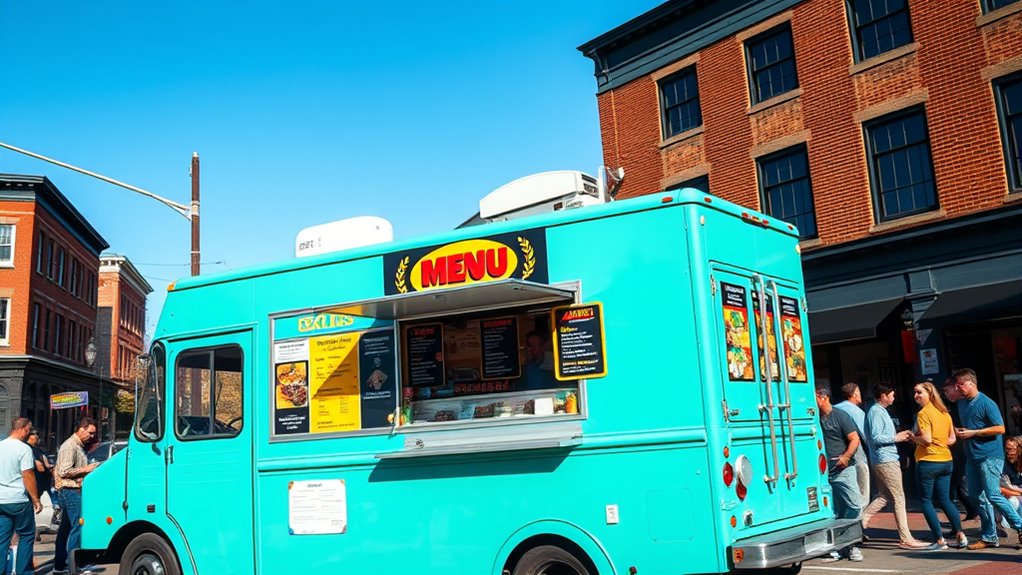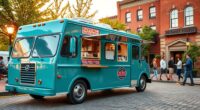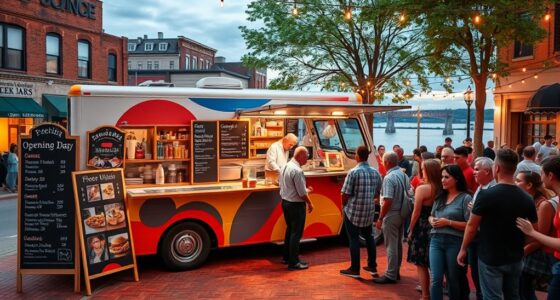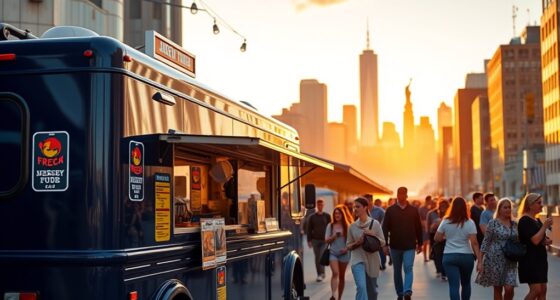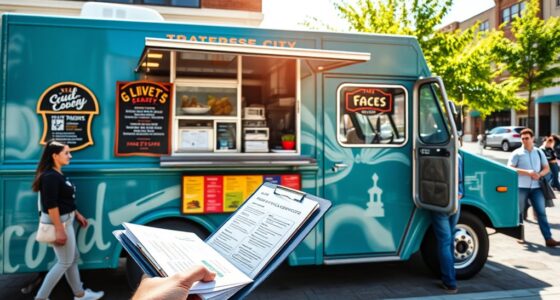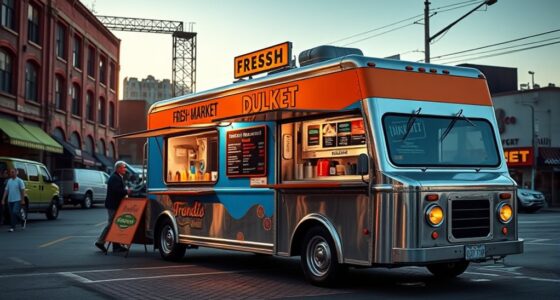To start a food truck in Norfolk, VA, you’ll need permits like a Mobile Food Unit Permit, health permit, and business license, plus strategic location choices such as downtown, festivals, or campuses. Budget between $40,000 and $150,000 for the truck, permits, and supplies. Craft a menu focused on seafood and local flavors, while offering options for dietary needs. Effective marketing with social media and community involvement will boost your success—explore further tips below.
Key Takeaways
- Obtain necessary permits including Mobile Food Unit, health, business license, and event-specific permits from local Norfolk agencies.
- Budget $40,000 to $150,000 for truck purchase, permits, inventory, and initial operational costs.
- Prime locations include downtown Norfolk, festivals, university campuses, beaches, and corporate districts for high foot traffic.
- Craft a menu emphasizing local seafood and dietary options like vegan, gluten-free, halal, with rotating specials.
- Promote your food truck through branding, social media, community events, and partnerships to attract diverse customers.
Navigating Permits and Regulatory Requirements in Norfolk
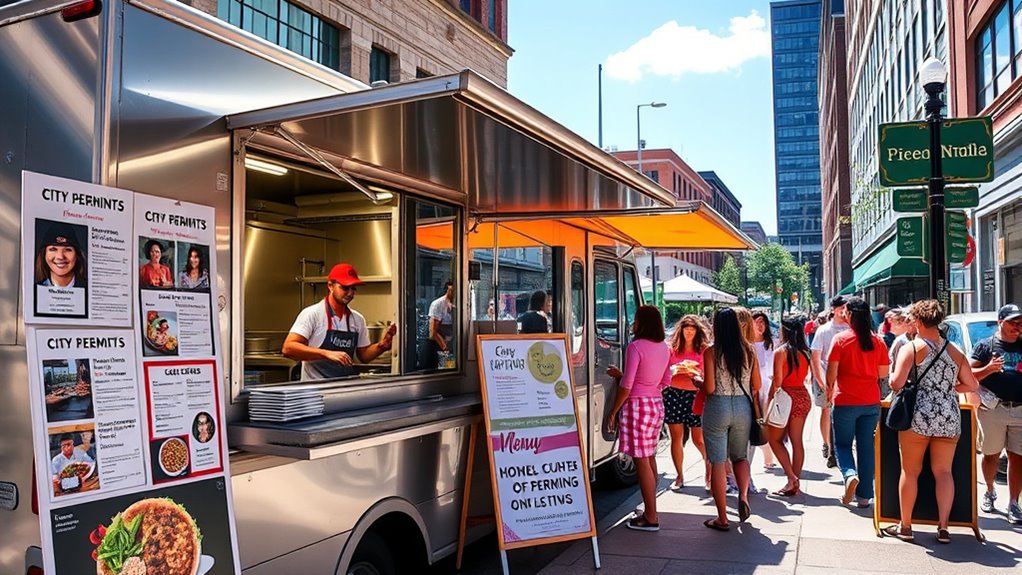
Navigating permits and regulatory requirements in Norfolk can seem complex, but understanding the key steps makes the process manageable. First, you’ll need a Mobile Food Unit Permit from the Norfolk Fire Marshal’s Office, along with a health permit after a plan review with the Environmental Health Department. You must also obtain a Business License from the Commissioner of the Revenue. If participating in events, a Temporary Food Permit from the Public Health Department is required. You’ll need to comply with zoning rules, fire codes, and grease disposal regulations, including FOG registration. A commissary agreement is necessary for access to service areas. Daily health checks, inspections, and maintaining proper documentation ensure ongoing compliance. Staying on top of permit renewals and local ordinances helps keep your food truck operation legal and safe. Health permit is essential to meet health and safety standards, and it must be renewed regularly to maintain compliance. Additionally, understanding regulatory compliance requirements can prevent costly violations and support a smooth operation.
Estimating Costs and Budgeting for Your Food Truck Venture
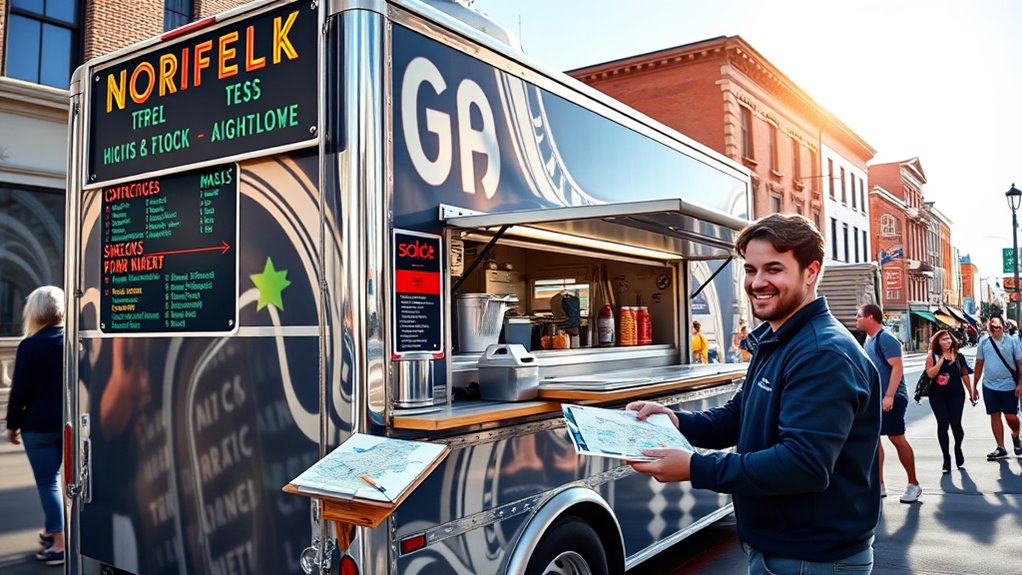
Estimating the costs and creating a realistic budget are essential steps in launching your food truck business. You’ll need to take into account the initial investment, including a truck that can cost between $40,000 and $150,000 depending on size and customization. Don’t forget licenses and permits, which can range from $1,864 to $28,276, plus $2,000 to $3,000 for inventory and about $300 for serveware and equipment. Fuel and maintenance costs start around $500 to $1,000 upfront. Operational expenses, like ingredients, supplies, fuel, marketing, staffing, and insurance, will recur weekly or monthly. Costs vary based on location, truck condition, menu complexity, and seasonal factors. Creating a detailed budget and regularly reviewing expenses will help you stay on track and manage costs effectively. Tracking expenses and adjusting your budget accordingly is key to maintaining profitability and avoiding unexpected financial challenges. Incorporating cost-saving strategies such as bulk purchasing and seasonal menu planning can further optimize your budget.
Identifying Prime Locations for Food Truck Operations
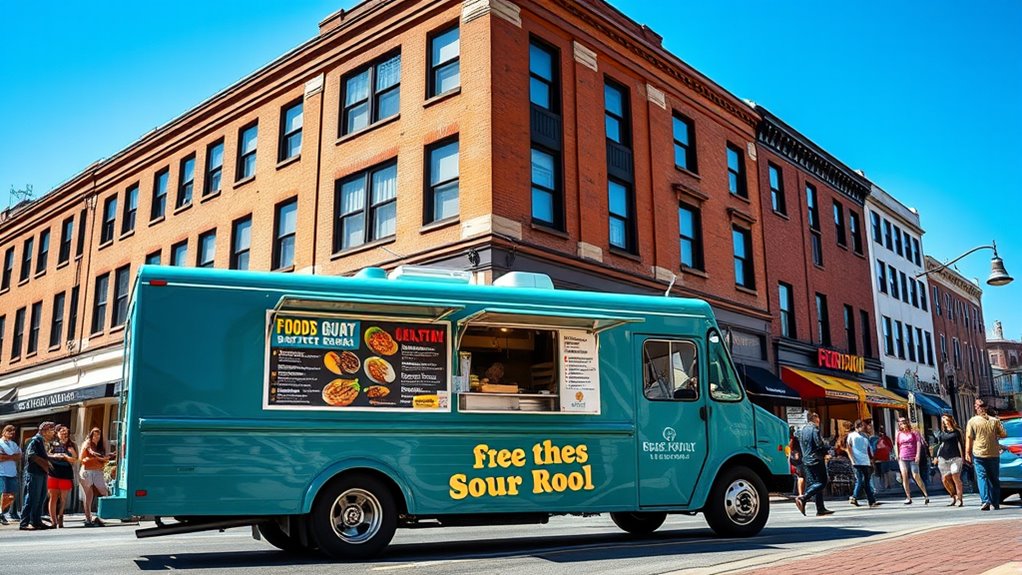
Choosing the right locations for your food truck can make or break your business. Focus on areas with high foot traffic and strong customer interest. Festivals and events at places like the Virginia Zoo draw large crowds, while downtown spots like Waterside District and Granby Street are always bustling. University campuses like Old Dominion University provide steady customers, especially during the school year. Beaches and waterfronts, such as Virginia Beach Boulevard, see increased traffic in the summer. Corporate districts also offer lunch crowds. Researching popular local spots and events can help you identify the best opportunities for visibility and sales. Use this table to compare potential locations:
| Location Type | Key Advantage |
|---|---|
| Festivals & Events | Large crowds, special occasions |
| Downtown & Waterfront | Consistent foot traffic, high visibility |
| University & Business | Steady, predictable customer base |
Choose wisely to maximize your truck’s success.
Crafting a Menu That Appeals to Local Tastes and Dietary Needs

To succeed in Norfolk’s competitive food truck scene, crafting a menu that resonates with local tastes and meets dietary needs is essential. Norfolk’s coastal location means seafood should be a staple—think crab cakes and fish tacos—that highlight fresh, local ingredients. Embrace the city’s cultural diversity by offering options like vegan, vegetarian, gluten-free, and religious dietary choices such as halal or kosher dishes, with clear labels for easy selection. Keep your menu focused with core favorites and rotate specials to keep things fresh. Use local surveys and community events to gather feedback, ensuring your offerings align with customer preferences. Collaboration with local chefs can add authenticity. Balancing variety with quality and pricing will build a loyal customer base enthusiastic for Norfolk-inspired flavors and inclusive options. Understanding local preferences can also help you develop a menu that appeals to a broad audience in Norfolk. The city hosts numerous food festivals and events throughout the year, providing excellent opportunities to showcase your menu and attract new customers.
Developing Effective Marketing Strategies to Grow Your Food Truck Business
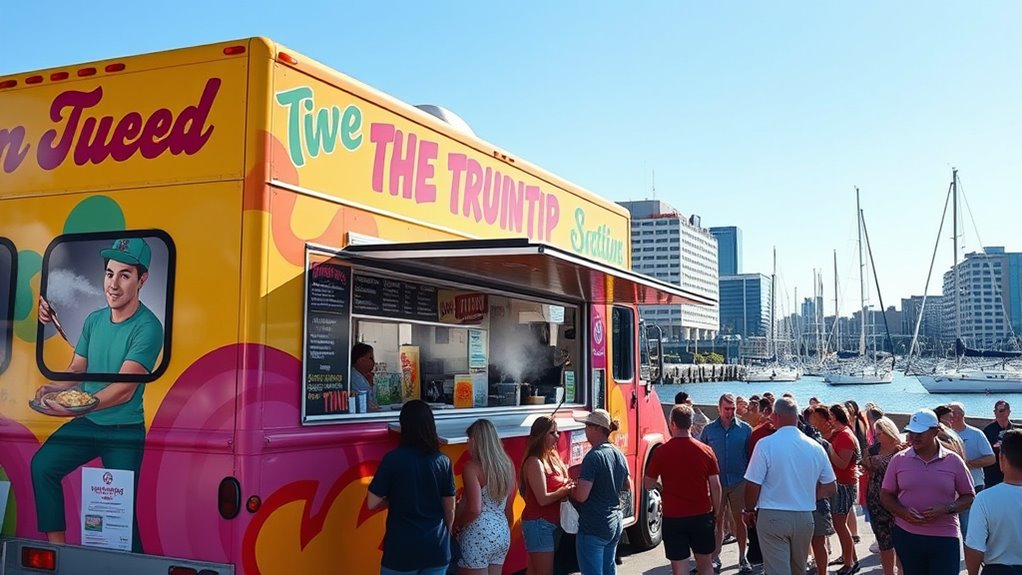
Building a strong marketing strategy is essential for your food truck’s growth in Norfolk. To stand out, develop a compelling brand identity with eye-catching graphics, consistent messaging, and a story that resonates. Offline strategies like collaborating with local businesses and participating in festivals boost visibility. Online, optimize your website for local SEO, stay active on social media with high-quality photos, and engage your audience through email marketing. Use data analytics to refine your approach. Here’s how to diversify your efforts:
| Strategy Type | Tactics | Benefits |
|---|---|---|
| Brand Identity | Visual design, storytelling | Builds loyalty |
| Offline Presence | Events, local collaborations | Expands reach |
| Digital Marketing | SEO, social media, reviews | Increases visibility |
| Community Engagement | Local initiatives, forums | Fosters local support |
| Promotions & Partnerships | Influencers, grand openings | Attracts new customers |
Additionally, understanding your target demographic, especially that over 40% of food truck consumers are under age 45, can help tailor your marketing efforts effectively. Recognizing consumer preferences such as convenience and innovation can help you craft messages that resonate with younger audiences and make your truck more appealing.
Frequently Asked Questions
How Long Does It Typically Take to Obtain All Necessary Permits in Norfolk?
You’re probably wondering how long it takes to get all your permits in Norfolk. Usually, after submitting your applications, the review process can take several weeks, especially if your paperwork is complete. Fire inspections are scheduled within days to a week, and permits are typically issued within about a month once everything’s approved. Keep in mind, delays can happen if additional information or inspections are needed.
Are There Any Restrictions on Operating Hours for Food Trucks in Norfolk?
You need to be aware that Norfolk has specific restrictions on food truck operating hours, which depend on your location and local ordinances. Operating hours may be limited near residential areas, during public right-of-way restrictions, or at certain events. You’re responsible for complying with these rules, and hours can vary if you’re at festivals or special events. Always check with city regulations to guarantee your truck operates legally during approved times.
What Are the Insurance Requirements for Food Truck Operators in Norfolk?
You need to meet Norfolk’s insurance requirements to operate a food truck. This includes having general liability insurance to cover accidents and injuries, commercial auto insurance for your vehicle, and equipment insurance for your kitchen tools. If you have employees, workers’ compensation is mandatory. Additionally, verify your policies are up-to-date, and request Certificates of Insurance when needed. Proper coverage protects your business, keeps you compliant, and gives you peace of mind while serving your customers.
Can I Operate My Food Truck Year-Round in Norfolk’S Climate?
You can operate your food truck year-round in Norfolk, but you’ll need to prepare for the climate changes. During colder months, insulate and add heating to keep your equipment and customers comfortable. In summer, implement cooling measures to maintain food quality. Stay aware of weather patterns, especially rain and temperature fluctuations, and adapt your operations accordingly. Proper planning helps ensure smooth year-round service despite Norfolk’s variable weather.
Are There Specific Regulations for Serving Alcohol From a Food Truck in Norfolk?
You need to follow specific regulations to serve alcohol from your food truck in Norfolk. First, obtain the necessary alcohol licenses, which require leasing or owning land for an alcohol license. You must also build a barrier around the alcohol area and guarantee servers are properly trained. Keep in mind, your food truck must meet health and safety standards, and licensing fees apply. Compliance ensures you can serve alcohol legally and responsibly.
Conclusion
Starting your food truck in Norfolk is an exciting journey, but remember, Rome wasn’t built in a day. By understanding permits, budgeting wisely, choosing the right locations, creating a tasty menu, and marketing smartly, you set yourself up for success. Stay flexible and persistent—your effort will pay off. Keep the saying in mind: “The early bird catches the worm,” and take action today to make your food truck dreams a reality.
